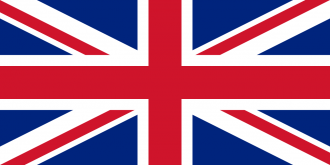The United Kingdom (UK) consists of a group of islands which are located off the north-western coast of Europe, between the Atlantic Ocean and the North Sea. It occupies a total area of approximately 244,820 km2 and has a coastline of 12,500 km. It includes four main territories; the largest is England followed by Scotland, Wales –collectively known as Great Britain- and Northern Ireland. To the east, it borders (across the North Sea) with the southwest of Norway, northwest of France, northwest of Germany and west of Denmark, Belgium and the Netherlands. Further to the west, it borders (across the Irish Sea, but also by land) with the Republic of Ireland. Overall, the UK has a population of about 65 million (2016 est.) of which more than 8.1 million people (according to the 2011 census) live in its capital, London.
The United Kingdom has established its power in Europe, escaping invasion and occupation for hundreds of years, while also managing to retain control of its strong national currency in recent times. Benefitting from the Napoleonic wars and getting advantage of the collapse of the French power, Britain dominated in the North Atlantic in the 19th century. Having control over trade routes into the Indian and Pacific oceans, the British Empire turned to be leader in the Industrial Revolution occurring at that period in Europe. Presuming upon the underdevelopment of the United States, it exploited a conspicuous opportunity aligning with its economic imperatives at that moment. Needing sources and routes to allow distribution of its production, Britain early integrated adversaries into beneficial trade relationships with its empire.
Britain lost its military and economic power during World War II. United States, pursuing its own interests, ‘saved’ Britain from being forced into an accommodation with Germany by retaining its dependency on them. Recognising the importance of alliances for its security, Great Britain benefited from the relationship with them and regained quickly its autonomy.
Since then, British society has experienced significant changes, including an expansion of higher education and home-ownership, a shift towards a services-dominated economy, mass immigration, a changing role for women and a strong cultural development. Nowadays, the majority of British citizens are highly qualified, however income inequality still exists and social mobility is low. Developing further towards a more knowledge-based economy (including innovation and skills), strengthening infrastructure and improving the financing of the economy are critical towards the development of British society and economy these days.
Finally, it is useful to mention that British security and prosperity have long been dependent on the geopolitical developments of continental Europe. Therefore, the fact that many European leaders now consider more seriously than ever before the creation of an EU Army, should not be underestimated by the UK. In addition, in terms of economic perspectives, many analysts are today understandably worried about the potential negative impact of the UK ‘Brexit’ vote (52% of UK citizens voted to leave the EU, in the Referendum of the 23th of June, 2016). UK access to the single market might be jeopardized and its position as a financial services centre in Europe could be threatened.

